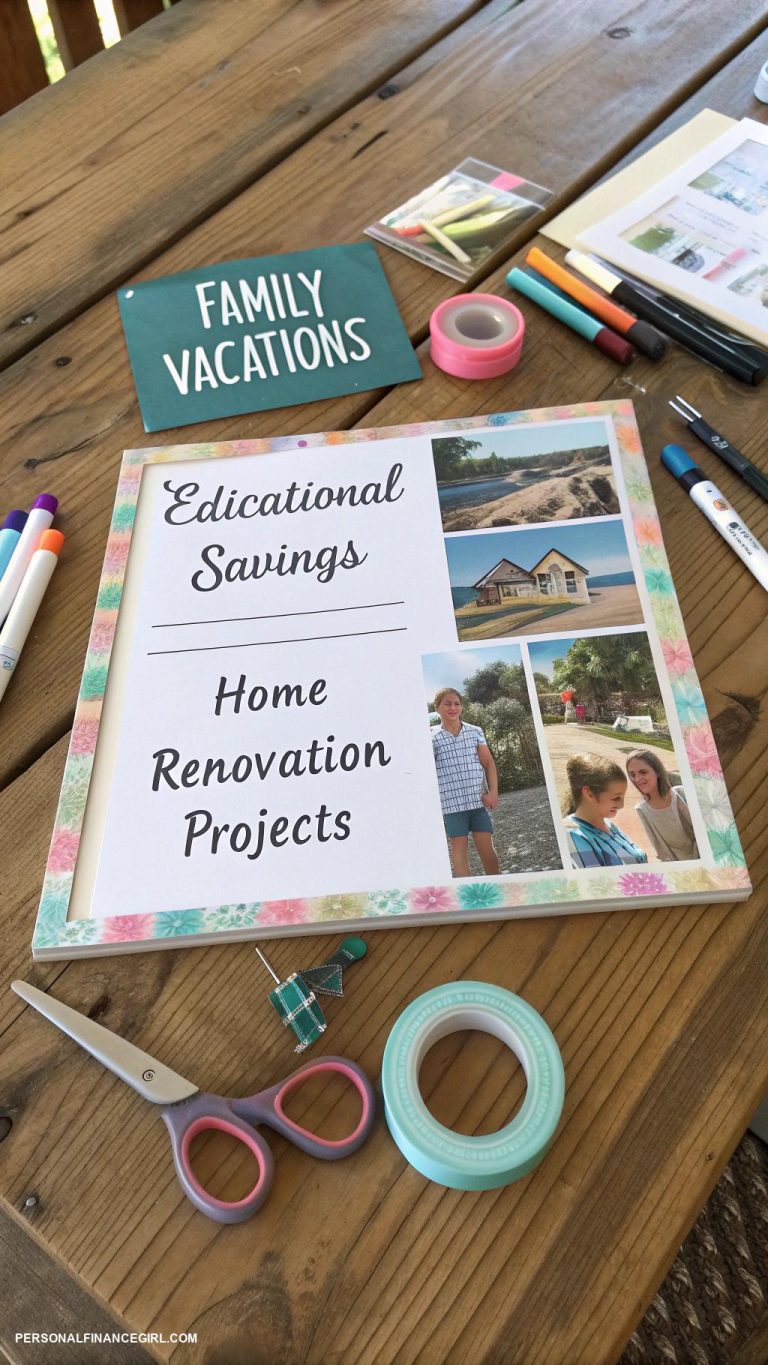How to Create a Budget (Beginner’s Guide)
Budgeting. It isn’t always fun, but if you want to get a grip on your finances, you need to do it.
You don’t have to like it.
You don’t have to look forward to it.
But you gotta do it if you want to make serious changes in your financial life!
Today I want to share some ways that you can create a budget as a beginner.
Define Your Why
“I’d like to have more money.”
This is something we all say. But it’s not enough of a “why” for a financial philosophy.
Sticking to a budget can be difficult, but it doesn’t have to be impossible. The best way to change new habits is to start with some psychology. Think about it, have you ever tried to change your lifestyle and fallen short? It’s usually because the “why” wasn’t defined enough.
Maybe you want to clear up financial stress in your life. Or you’re at the point in life where you want to save for something substantial like a home. Or maybe you just want to break the cycle of living paycheck-to-paycheck.
Staying focused on your “why” will make your mindset better for staying on track.
Set Clear Goals
Budgeting goals help bring your “why” to fruition. It’s essential to set goals that are both specific and measurable. What does that look like?
Say your goal is to buy a house. On the surface that goal sounds complete, but you could be setting much clearer goals.
You might need to work backwards. What mortgage payment can you afford each month? What mortgage rate do you qualify for? Then it might be easier to determine your down payment.
A more specific and measurable goal may be, save $100,000 for a down payment for a house over the next three years.
Most people can’t stick to a budget if they aren’t working towards something important to them, so this is key for creating a longstanding financial future.
Track Income and Expenses
Budgeting is a lot like a diet. If your diet is too strict, you are bound to have too many cheat days. This won’t lead to you accomplishing your goals. Budgets need to be realistic so they can be incorporated into your everyday life effortlessly.
This article is all about setting up a budget that you will actually stick with and is sustainable. The key to this is understanding what is typical. You don’t want to create a budget that feels impossible.
If you have a traditional job with a paycheck, then knowing your income after taxes is fairly straightforward. You paycheck will list your take home pay after taxes, and your paycheck should come at predictable times.
If your income isn’t a traditional paycheck, you may need to look back several months to see what is typical.
Expenses can be a lot more unpredictable before establishing a budget. You might not be aware of how much money you are spending. It is key to really look back at your spending history.
List your expenses on a spreadsheet, and categorize these expenses so you can start to see a pattern. See how often you eat out, fill up your car, pay typical bills, and go shopping.
Outline Your Budget
After looking at your income, you should have a pretty good idea of what money comes in each month.
The expenses are the part of the budget that you will need to look closely at and evaluate. List out necessary expenses first– rent, car payment, insurance, utilities, and anything else that you have to pay each month.
Subtract that from your net income. Hopefully, you’re still in the positive.
If you have money left over, here is where you look at your priorities. Think back to why you are budgeting and place a column in your budget for your “why.” Integrate your goal into your budget the same way you put the expenses that had to be there. This is where you start prioritizing.
Then add your extras. This is where you add those fun nights out with friends, shopping trips, and pedicures that you spend your money on.
You might not be able to do all of your wants, but you will accomplish more substantial goals.
Expect the Unexpected
Always have enough for a rainy day. The reality is that once you start sticking to a monthly budget, you might become frustrated with unexpected expenses.
Think about the unexpected expenses that you have experienced recently. Surprise dental work, a friend’s baby shower, and then a bridesmaid’s dress for a wedding this summer. It all can really add up. These are expenses that just seem to come out of nowhere are not necessarily recurring.
You’re not a fortune teller, but you can try to predict some of these things with a reserve or sinking fund. This is a reserve of money that is accessible for those rainy days.
Once you dip into your reserve fund, it is important to replenish it over time. This might mean that you need to tweak your monthly budget a bit for a few months.
Decide on a Savings Plan
You’ve established a budget that you have been able to stick with, and you’re rocking it. Awesome! Now is the time to make some financial gains with a savings plan.
There are a lot of different ideas about this floating around. But one that I am fond of is the 50/20/30 Rule.
The 50/20/30 Rule means that 50% of your net income goes to your needs. This could include rent, groceries, car payment, utilities, and any other necessities. The “wants” take up 30% of your net income. Then 20% goes towards savings and debt repayment.
This rule helps you understand how to structure a budget, and you can grow with this philosophy as you build wealth.
Budgeting Apps
There is a multi-billion dollar industry out there for developing apps on budgeting. Here are a few that are popular.
Mint is a free app that connects with your bank account and budget. This app will automatically categorize your spending into different categories so you can better understand where your money is going, and see your progress throughout the month.
You Need a Budget (YNAB) is similar to Mint, but does have a monthly fee. This service will connect to your accounts and give you reports to how you are spending and saving.
Having trouble with formulating a budget? Pocketguard will analyze your income and goals, and build one for you. This one also comes with a fee, but is worth checking out.
Reassess and Update Your Plan as Needed
At the end of each month evaluate your progress.
Does it feel impossible to spend less than $100 at the grocery store each week? You might need to tweak your budget so that you can spend $120. Do you find that you aren’t using that gym membership, cancel it.
Your budget is not set in stone, and it will change just as you change. The important thing is that you have an awareness of how you spend your money, and you are setting goals for your future.
Give Yourself Time
Give yourself time to adjust to your new budget methodology. It’s okay if you mess up for the first week or two, but after a month you should have a good grasp on how your budget works in your life. If it doesn’t, you may need to adjust certain things.
Avoid Spending Temptations
Try to avoid spending Temptations like visiting the mall, shopping online, and browsing through Instagram. Keeping yourself out of situations where you are tempted to spend money is a great way to stick to your budget and make sure that you stay on target.
Follow the Experts
Lastly, listen to the experts when it comes to personal finance advice. There are many different personal finance gurus you can find on the internet, but not all of them know what they’re talking about. No matter what advice you read, be sure to do your own research, but your own due diligence, and ensure that you have a full understanding of the financial advice that you are reading.
Dave Ramsey
Dave Ramsey is the most well-known name in the finance and budgeting world. He has made a name for himself by helping thousands of people successfully work their way out of debt and on to financial freedom. Part of Dave’s services include the advice of investing professionals. It’s important to note that these professionals operate under the 7 baby steps to wealth that Ramsey promotes. Therefore, they are likely to tell you that you need to get to a certain baby step before you should start investing. The first baby step is to save $1000 in an emergency fund. After that, you pay off all your debt except for your house. When you have done that, you save 3-6 months in a fully funded emergency fund. Then it’s time to save for your children’s college expenses. After that, it’s time to start talking to investment professionals. If you are in that boat, it would be a perfect time to contact one of these professionals.
Robert Kiyosaki
Another well-known personal finance advisor is Robert Kiyosaki. Robert Kiyosaki has been has become world-famous for writing the best selling personal finance book Rich Dad Poor Dad. In this book he explains how financial education is the key to making money, saving money, getting out of debt, building wealth, and sustaining it for a lifetime.






